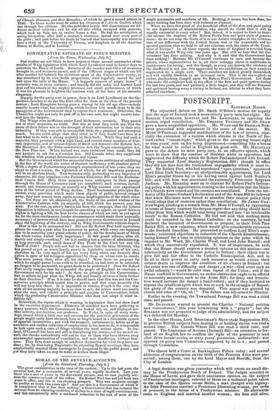The adjourned debate on Mr. Smith O'Brien's motion for inquiry
into the state of Ireland took a more strictly party turn last night. Mr. BAILLIE COCHRANE, however, and Mr. LASCELLES, in opposing themotion, urged conciliation. Mr. EMERSON TENNENT and Mr. aneri gave a more unqualified opposition. Mr. WARD and Sir DENHAM NOR• REYS proceeded with arguments in the sense of the mover. Mr. MORE OTERRALL suggested modifications of the law of tenures, especially the extension of a custom which obtains in the North of Ireland called "tenant-right," which gives to the occupying tenant eight or nine years' rent on his being dispossessed—something like a bonus for what would be called in England his good-will. Mr. MACAULAY gave to the debate its most party turn, in an effective speech, which went to show that the conduct of Minister while in opposition had aggravated the difficulty which Sir Robert Peelranticipated with Ireland. They supported Lord Stanley's RegistrationaBill ; though in office they did not dare face the tremendous unpopularity which it must incur. Sir Robert Peel, who had reprobated "open questions," appointed Lord Eliot Irish Secretary—an unobjectionable appointment, but Lord. Eliot's peculiar fitness lay in his having voted against Lord Stanley's bill ; and with him was associated the extremely Protestant Sergeant Jackson. Mr. Macaulay went on to contrast Sir Robert Peel's forbearing policy with his appointments, coming to the conclusion that the Minister's friends were cooled and his enemies not conciliated. From the tendency of SirJames Graham's declaration and of the Arms Bill he inferred that when Ministers were forced to abandon their neutral policy they would adopt that of coercion rather than conciliation. Sir JAMES GRAHAM began, alluding to a remark from Mr. More ()Terra% by expressing. in terms of hearty courtesy his deepest regret that any thing should have fallen from him which would bear being construed into "an intolerable insult" to the Roman Catholics. He had not said that nothing more could be conceded to the Roman Catholics: on the contrary, he had declared the intention of Government to propose, in their Irish Poor Relief Bill, a new valuation, which would give considerable extension to the freehold franchise. He proceeded to confirm Lord Eliot's arguments; reiterated objections to reduction of the Church Establishment;. losing himself for a time in criticising opinions on the point which he imputed to Mr. Ward, Mr. Charles Wood, and Lord John Russell ; and which they successively repudiated. It was of importance, he said, that the House should express a decided opinion on this motion—one substantially on the Government policy in Ireland : their object was to give full and fair effect to the Catholic Emancipation Act, and todo all in their power to carry such measures as would evince their earnest desire to improve the condition of all classes in Ireland : but the crisis was one of difficulty and danger ; a war—God avert such an awful calamity l—would be safer than repeal of the Union ; and if the House confided in Government, no undue obstruction ought to be offered. to necessary measures, such as the Arms Bill ; for delay and irresolution would increase the danger a hundredfold ; and if they hesitated to. repress the rebellious spirit which was at work in the struggle of Repeal,. the glory of the country was departed. This appeal was greeted by cheers and cries of" Oh, oh ! " The debate was adjourned to Monday.
Earlier in the evening, the Townshend Peerage Bill was read a third time, and passed.
Mr. DONCOMBE wanted to present the Chartist " National petition and remonstrance," this year terminating with a "prayer"; but theSPEAKER was not prepared to judge of its admissibility, and the subject was deferred till Monday.
In the other House, Lord Br:mow:rases Slave-trade Suppression Bill, to prevent British subjects from dealing in or holding slaves, was reads. second time. The Canada Wheat Bill was read a third time, and passed. The Limitation of Actions (Ireland) Bill—an extension to Ireland of an English law to confirm the right of the possessor in land after three incumbencies, or sixty years' possession, undisturbed—wan opposed on going into Committee ; supported by 30 to 4; and passed. through Committee.
The Queen held a Court at Buckingham Palace today ; and several addresses of congratulation on the birth of the Princess Alice were presented; among them, one by the Lord Mayor and Sheriffs, from the City of London.


























 Previous page
Previous page